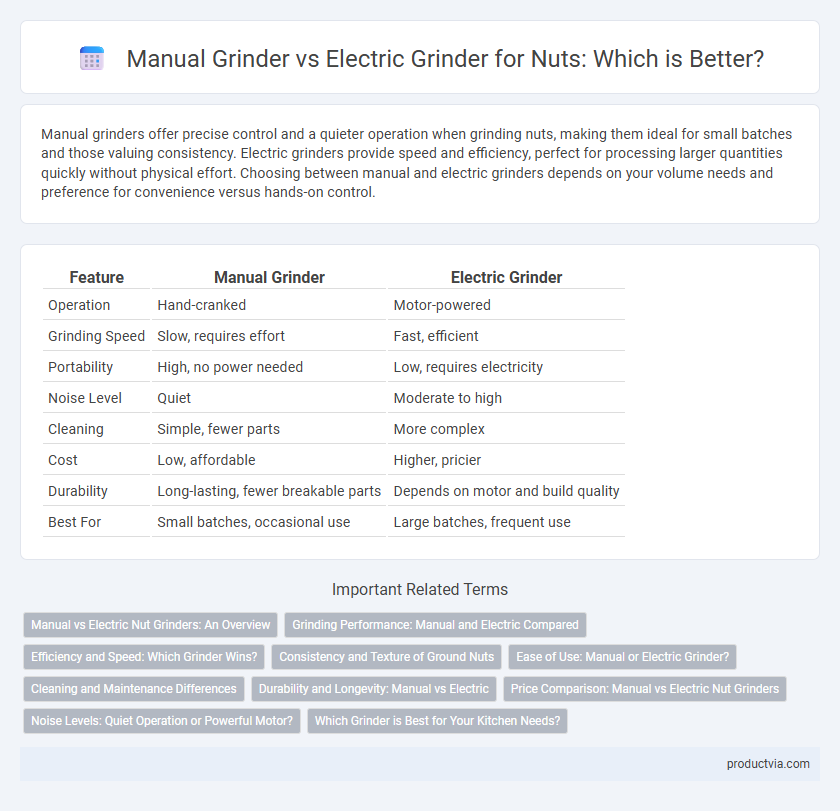Manual grinders offer precise control and a quieter operation when grinding nuts, making them ideal for small batches and those valuing consistency. Electric grinders provide speed and efficiency, perfect for processing larger quantities quickly without physical effort. Choosing between manual and electric grinders depends on your volume needs and preference for convenience versus hands-on control.
Table of Comparison
| Feature | Manual Grinder | Electric Grinder |
|---|---|---|
| Operation | Hand-cranked | Motor-powered |
| Grinding Speed | Slow, requires effort | Fast, efficient |
| Portability | High, no power needed | Low, requires electricity |
| Noise Level | Quiet | Moderate to high |
| Cleaning | Simple, fewer parts | More complex |
| Cost | Low, affordable | Higher, pricier |
| Durability | Long-lasting, fewer breakable parts | Depends on motor and build quality |
| Best For | Small batches, occasional use | Large batches, frequent use |
Manual vs Electric Nut Grinders: An Overview
Manual nut grinders offer precise control over grind size and texture, making them ideal for small quantities and detailed processing. Electric nut grinders provide efficiency and speed, handling larger volumes with consistent results and less physical effort. Choosing between manual and electric options depends on user preference for control versus convenience and grinding frequency.
Grinding Performance: Manual and Electric Compared
Manual grinders offer precise control over grind size and texture, ideal for small batches of nuts with consistent results. Electric grinders provide faster, more efficient grinding, especially suitable for larger quantities, but may generate heat that can affect nut oils and flavor. Selecting between manual and electric grinders depends on balancing desired grind uniformity, processing speed, and impact on nut quality.
Efficiency and Speed: Which Grinder Wins?
Electric grinders outperform manual grinders in efficiency and speed when processing nuts due to their motorized operation, allowing them to handle larger quantities quickly with consistent results. Manual grinders require physical effort and more time, making them less suitable for high-volume or frequent use. For tasks requiring rapid, efficient nut grinding, electric models are the clear choice.
Consistency and Texture of Ground Nuts
Manual grinders offer greater control over the consistency and texture of ground nuts, allowing for precise adjustments to achieve coarser or finer results as desired. Electric grinders may produce uneven particle sizes due to their high-speed blades, often leading to inconsistent texture in nut butters or toppings. For recipes requiring uniformity and smoothness, manual grinders generally provide superior consistency compared to their electric counterparts.
Ease of Use: Manual or Electric Grinder?
Electric grinders offer superior ease of use compared to manual grinders by significantly reducing physical effort and grinding time when processing nuts. Manual grinders require consistent hand strength and can cause fatigue, especially with tougher nut varieties or larger quantities. For frequent or bulk nut grinding, electric models provide a faster, more convenient experience with consistent results.
Cleaning and Maintenance Differences
Manual grinders for nuts offer simpler cleaning processes due to fewer mechanical parts and easy disassembly, reducing buildup of oily residues. Electric grinders require more thorough maintenance to prevent motor damage and ensure safety, often involving specialized brushes and careful moisture avoidance. Both types benefit from regular cleaning, but manual grinders generally demand less time and effort.
Durability and Longevity: Manual vs Electric
Manual grinders for nuts typically offer superior durability and longevity due to their simple mechanical design and fewer moving parts, reducing the risk of breakdowns. Electric grinders feature more complex components prone to wear and tear, which may shorten their lifespan without regular maintenance. High-quality manual grinders made from robust materials like stainless steel can last decades, whereas electric grinders often require replacement parts or eventual replacement after several years of frequent use.
Price Comparison: Manual vs Electric Nut Grinders
Manual nut grinders are significantly more affordable, with prices typically ranging from $10 to $30, making them an ideal choice for budget-conscious consumers or occasional use. Electric nut grinders, however, usually cost between $40 and $150, reflecting their faster grinding speed and convenience, though this higher price may not justify the investment for those with light or infrequent nut grinding needs. When deciding between manual and electric options, the price difference often correlates directly with usage frequency, desired grinding efficiency, and ease of operation.
Noise Levels: Quiet Operation or Powerful Motor?
Manual grinders for nuts offer quiet operation due to their simple, hand-cranked mechanism, making them ideal for noise-sensitive environments. Electric nut grinders, equipped with powerful motors, deliver faster grinding but generate significantly higher noise levels, which may be disrupting in shared spaces. Choosing between a manual or electric grinder depends on balancing the need for quiet use against the efficiency of a high-powered motor.
Which Grinder is Best for Your Kitchen Needs?
Manual grinders offer precise control and preserve the natural oils of nuts, making them ideal for small batches and culinary enthusiasts who prioritize texture and flavor. Electric grinders provide speed and efficiency, handling larger quantities effortlessly with consistent results, perfect for busy kitchens or frequent use. Choosing the best grinder depends on your kitchen volume, desired speed, and preference for manual craftsmanship versus automated convenience.
Manual grinder vs Electric grinder for nuts Infographic

 productvia.com
productvia.com